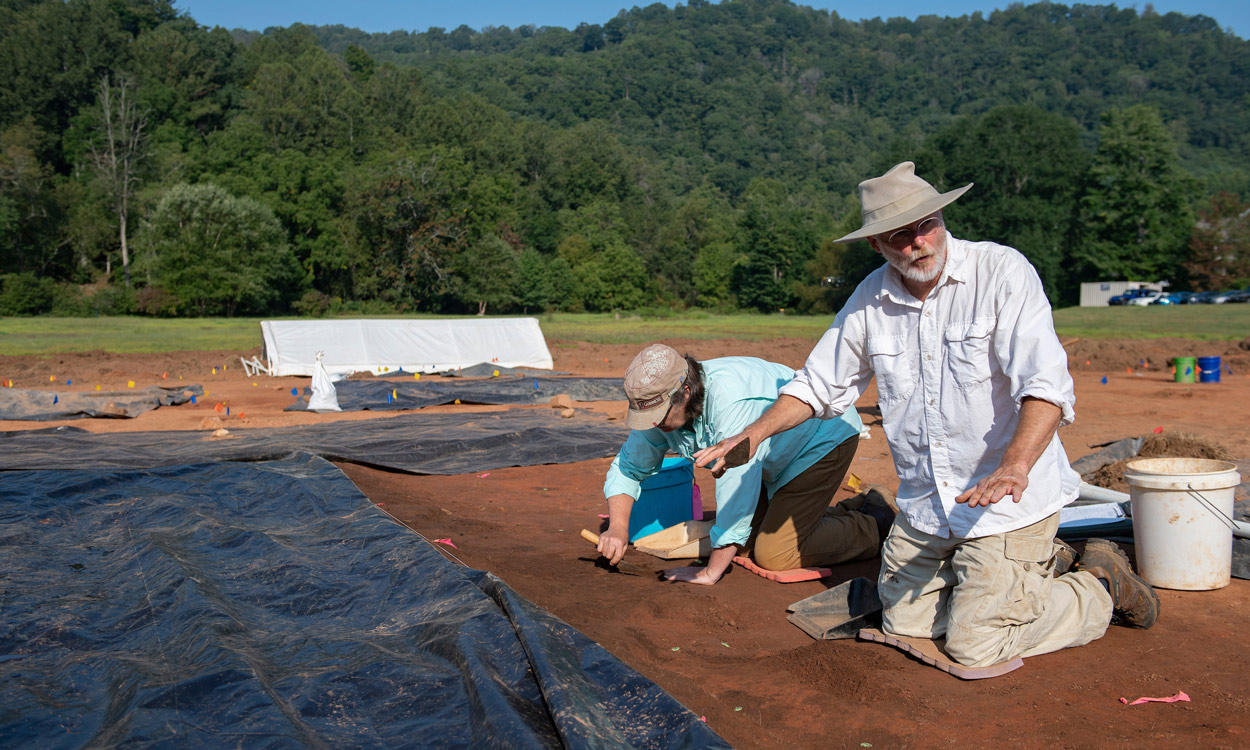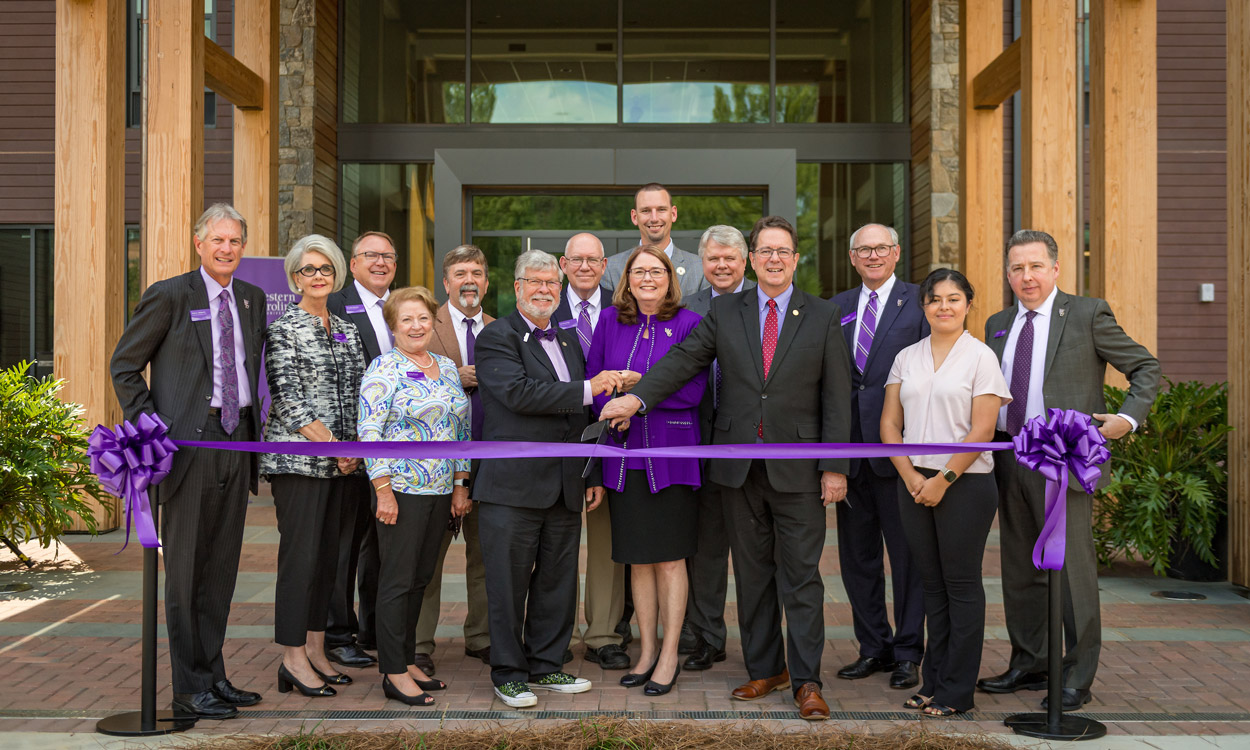Creating courts where no veteran is left behind
By Tom Lotshaw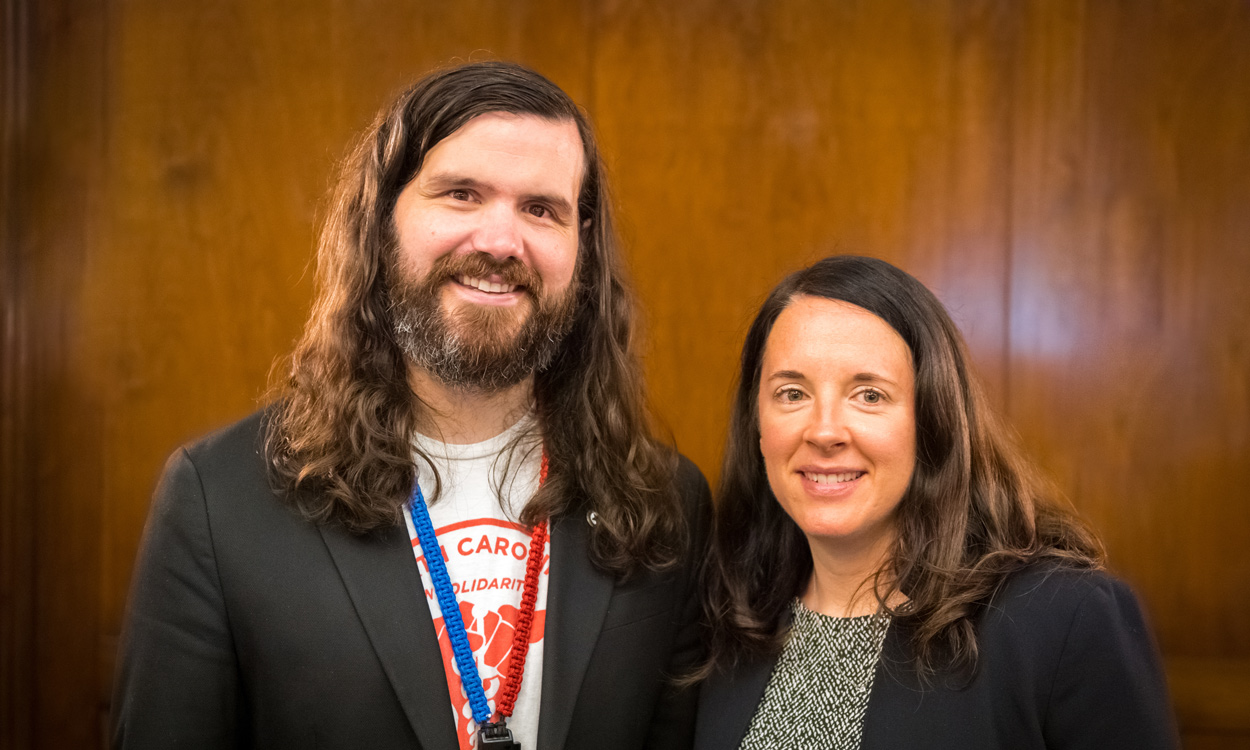
Kevin Rumley (left) and Jamie Vaske
A Western Carolina University professor helped create Buncombe County Veterans Treatment Court. She will now help lead a study exploring how effective such courts are at helping struggling veterans in the criminal justice system achieve stability.
Jamie Vaske, a criminal justice professor, continues to serve as a pro bono evaluator for the veterans treatment court in Asheville. She will partner with American University, Veterans Affairs and Michael Wilson Consulting to lead the five-year, $3 million study.
Funded by the National Institute of Justice, an arm of the U.S. Department of Justice, the study aims to advance more effective, evidence-based practices for one of the country’s fastest-growing types of specialty courts.
The treatment courts strive to rehabilitate veterans who are facing criminal charges and struggling with often connected issues ranging from trauma and mental health disorders to addiction, unemployment and homelessness.
Judges, prosecutors, defense attorneys and partners including veterans advocates and medical, therapy and housing providers work together to connect veterans with needed treatments. Veterans who complete the programs can avoid incarceration and see charges reduced, dismissed or expunged.
The first commonly-cited veterans treatment court opened in 2008. There are now about 600 veteran-focused court programs nationwide. The study will evaluate at least six.
The goal is to look at a range of widely-varying program models and sizes. Some serve only veterans facing lower-level misdemeanors. Others, like Buncombe County, accept veterans facing felonies. Veteran eligibility also can vary. Some programs serve only honorably discharged U.S. veterans, while others serve broader ranges of veterans, family members, military contractors or even veterans of foreign allies.
“There’s been a proliferation of these courts and they are performing in a lot of different ways, with a lot of emotion behind them,” Vaske said. “We want to know what they are doing, if they are proving beneficial and if we are using tax dollars in effective ways.”
After two decades of conflict in the Middle East involving millions of U.S. service members, demand for treatment courts and other veteran services is anticipated to continue growing. Some researchers predict that demand might not peak until the 2040s because mental health and substance abuse disorders can take years, or decades, to develop.
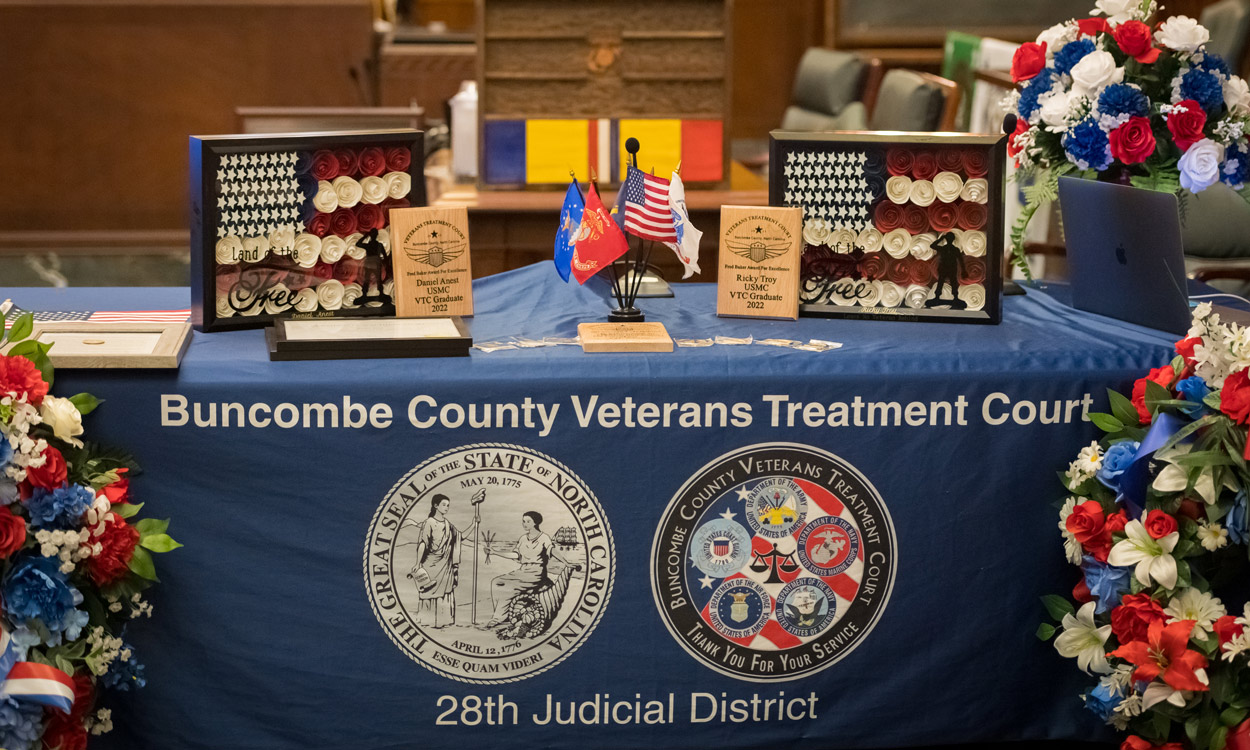
Buncombe County Veterans Treatment Court is one of five such courts in North Carolina. It can accept veterans from around the state and serve up to 30 people each year. It’s not just Iraq and Afghanistan veterans getting help. Vietnam veterans are also being served.
“Now we have the opportunity to provide them with the best care we can,” Vaske said. “Which is beautiful, helping these individuals gain a period of sobriety and reestablish relationships with their adult children.”
As the treatment court evaluator, Vaske analyzes policies and processes and recommends improvements. She’s also involved in recommending sanctions, therapy adjustments and incentives for veterans, helping ensure the program follows best practices.
The court is coordinated by Kevin Rumley, who earned a master’s in social work from WCU in 2018 and knows the struggles veterans can face.
Rumley was seriously injured as a 20-year-old Marine in Iraq in 2004. An explosion killed his best friend next to him and blew out his legs, leaving his body riddled with shrapnel. Doctors predicted Rumley would never walk again, which proved false. After 32 surgeries and 18 months in the hospital he was discharged with a bag of opioids, no plan and an addiction that quickly spiraled out of control.
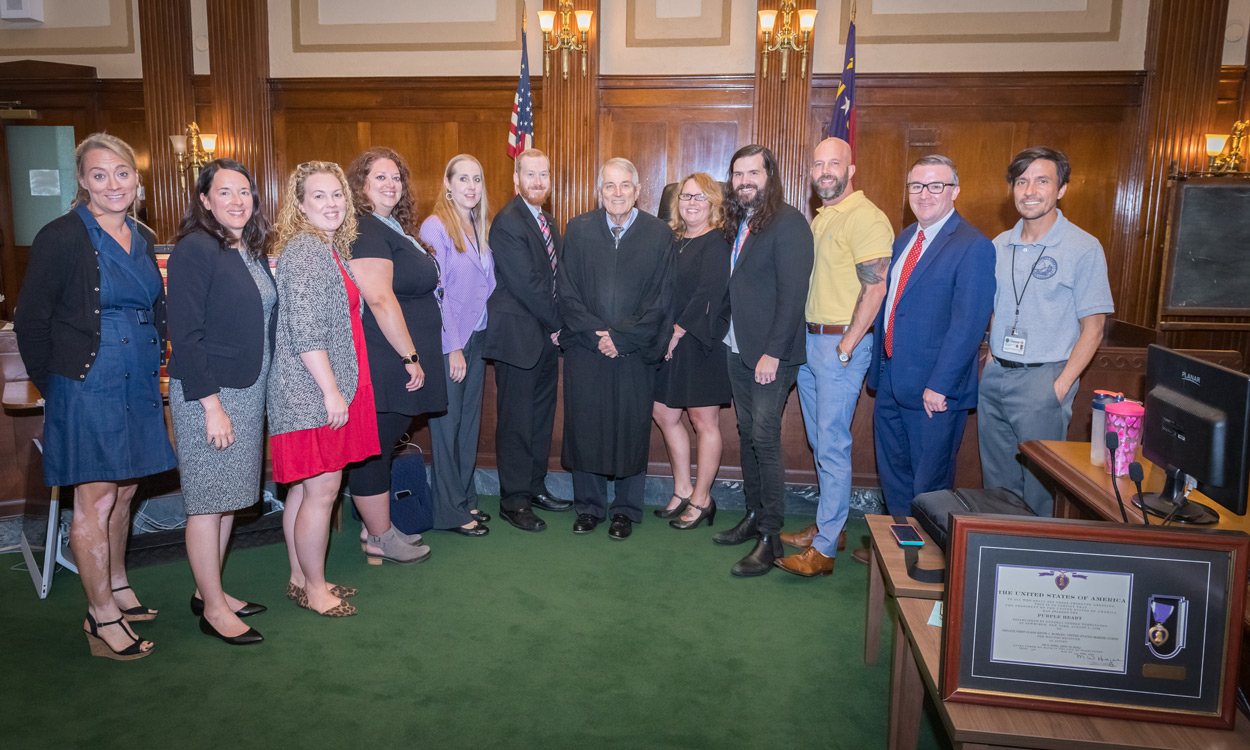
The team at Buncombe County Veterans Treatment Court.
Rumley has seen people enter the court at their lowest possible level. He’s seen people leave having changed their lives in every way possible. He said he enjoys being someone in their corner throughout the hard journey to recovery.
“The driving force for me is seeing these veterans transform their lives in meaningful ways, and getting to be a part of their journey,” Rumley said. “Every day these veterans are showing up, trying their hardest and being honest with themselves and the community. They’re able to become a new person, the best version of themselves.”
Rumley credits Vaske as a major part of the treatment court’s success. She’s brought knowledge, research and training to the program and secured hundreds of thousands of dollars of grant funding to keep it going, he said.
“She selflessly believes in this model and wants to support community members and veterans in the legal system,” Rumley said. “She’s made our program better, because now we are not just well-intentioned people guided by emotion. Our actions and behaviors are informed by best practices that better support positive outcomes.”
‘Leave no veteran behind’
Veterans who opt into the treatment court are not alone throughout the process, or afterward. That reality was on display this August when two men graduated — marking the court’s tenth graduation since 2015.
The 18- to 24-month program is incredibly challenging, but has a significantly lower recidivism rate than the traditional criminal justice system, said Judge Marvin Pope, who also helped create the treatment court and led the graduation ceremony.
“When somebody comes into veterans treatment court, they usually are unemployed, they have no housing, they have a drug addiction or mental illness or all kinds of other issues we can help them with,” Pope said. “I could tell you stories that are just amazing about what these veterans have been through. I’m so proud of them, that they reach this point.”
For the graduation, a fifth-floor courtroom was full of family, veterans advocates, mentors and service providers, as well as law enforcement, prosecuting attorneys and public defenders.
Judge Pope read the two men congratulatory letters from N.C. Attorney General Josh Stein. The Welcome Home group presented them with handmade quilts. Two veterans from Brothers and Sisters Like These briefly shared their own stories. Warrior Canine Connection, which trains service dogs for veterans, also attended. One of the graduating veterans became involved with the group, helping train two dogs, Dotty and Slick.
Finishing the program isn’t easy. Neither is the road ahead. Recovery is a continuum, said Rumley, who describes his own return to hope, stability and purpose as a journey of a million steps.
One of the men graduating repeatedly failed drug tests, was arrested for drug possession and overdosed in the courthouse at one point, nearly dying. He persevered, though he still struggles with anxiety and nearly constant pain. Seated beside him were his young son, who he reestablished a relationship with, and a loving girlfriend who the man said accepts him as he is.
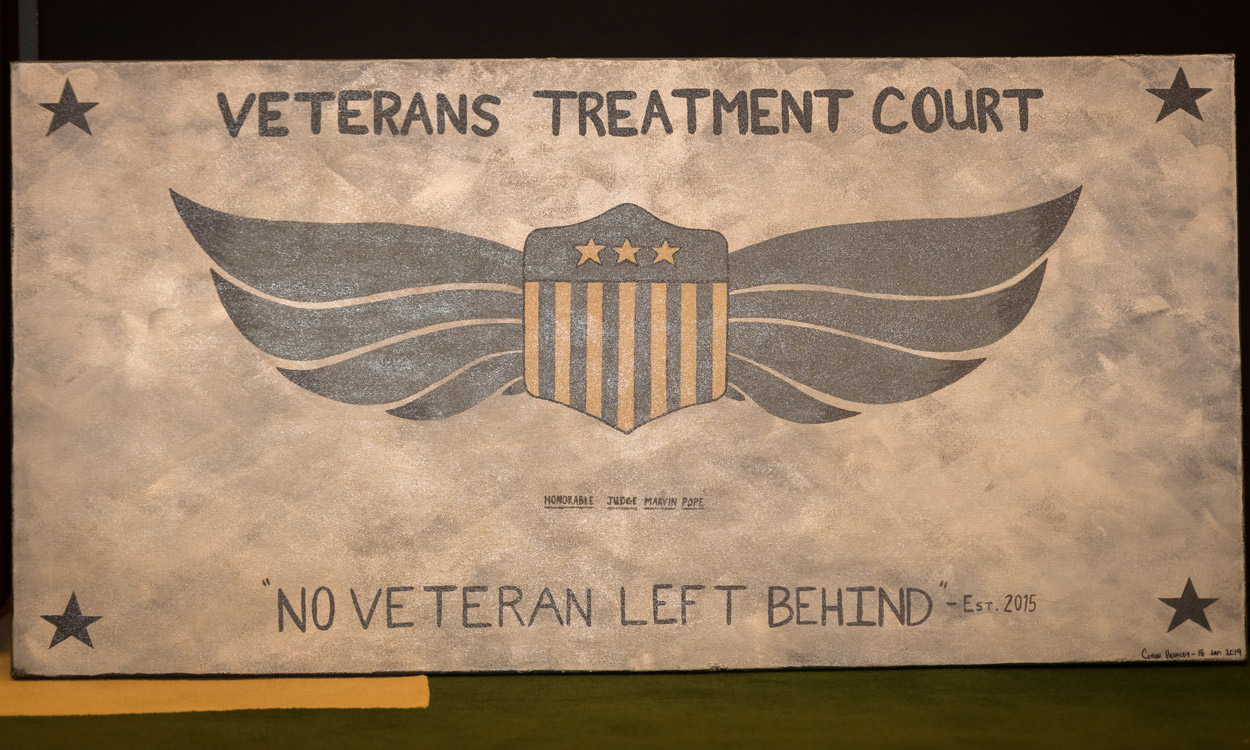
Every soldier is a changed person, Warren Dupree, a member of the Eastern Band of Cherokee Indians and Steve Young Deer American Legion Post 143, told the two men and the courtroom. “I commend you for what you are doing, for what you have done,” he said. Dupree presented the men with Cherokee necklaces to remind them they will never be alone on the road ahead. Each necklace featured an arrowhead flinted by a member of the Tribe.
“He puts spiritual power in every necklace to help you, to guide you. All the Creator asks is you keep the faith,” Dupree told the men. “Your journey is continuing until the day you leave us to be with the Creator, but you will never be alone. The entire Eastern Band of Cherokee Indians veterans community will be with you and we will not leave you behind.”
Buncombe County Veterans Treatment Court’s motto is “leave no veteran behind.” Rumley and Vaske said they hope the upcoming study can help it and other treatment courts across the state and country more effectively live up to that motto.
